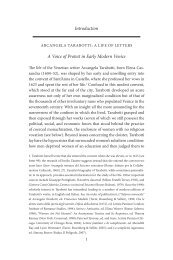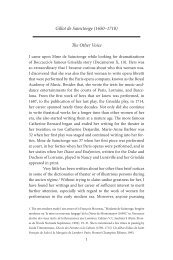Excerpt - Iter: Gateway to the Middle Ages and Renaissance
Excerpt - Iter: Gateway to the Middle Ages and Renaissance
Excerpt - Iter: Gateway to the Middle Ages and Renaissance
You also want an ePaper? Increase the reach of your titles
YUMPU automatically turns print PDFs into web optimized ePapers that Google loves.
24 Edi<strong>to</strong>r’s Introduction<br />
The speaker in poem 30 gently reminds her beloved that if he treats<br />
her “rudely,” as “master,” he will never gain what he seeks. In poem 16,<br />
<strong>the</strong> poet reminds her beloved that if God has given him fine assets,<br />
she herself has been given reason’s power <strong>to</strong> judge him, <strong>and</strong> asks<br />
that he behave reasonably. 56<br />
Throughout <strong>the</strong> collection, <strong>the</strong> female<br />
poet rarely speaks in a voice characterized by servility or absolute<br />
humility. Filled with jealousy at <strong>the</strong> sight of her lover conversing<br />
with o<strong>the</strong>r women, she does not st<strong>and</strong> by in any docile manner, but<br />
reminds <strong>the</strong> beloved, through her verse, that she alone is worthy of<br />
his eloquent attentions. In poem 41, <strong>the</strong> speaker claims that she in no<br />
way wishes <strong>to</strong> restrain her beloved’s liberty, but <strong>the</strong>n explains that he<br />
should prefer her company because <strong>the</strong> “o<strong>the</strong>rs”—her rivals—are not<br />
as worthy of his “fine conversation” (“sainct entretien”) as is her own<br />
heart, which belongs <strong>to</strong> him.<br />
Jealousy does not prevent her from seeing <strong>the</strong> humor in her own<br />
reactions. In a playful <strong>to</strong>ne, poem 49 relates a scene that <strong>the</strong> speaker<br />
observes between her beloved <strong>and</strong> ano<strong>the</strong>r woman, <strong>and</strong> pokes fun<br />
at her own ensuing feelings of envy. In this tableau, Cupid (Amour)<br />
happens upon <strong>the</strong> seated couple engaged in common flirtation, shoots<br />
a few “words”—ra<strong>the</strong>r than flaming arrows—in <strong>the</strong>ir direction, <strong>and</strong><br />
departs with a bli<strong>the</strong> callimera (Greek for “have a nice day!”). Jealousy<br />
causes <strong>the</strong> speaker watching <strong>the</strong> scene <strong>to</strong> wonder if she has overheard<br />
correctly, worrying that perhaps Cupid really proclaimed what she<br />
fears most:<br />
When lo! Cupid burst forth with impish glee,<br />
Raised his bow, <strong>and</strong> aimed a fiery dart:<br />
He let fly four words as he drew apart<br />
And left <strong>the</strong> scene: Catch you later, ciao!<br />
But, oh! suspicion shot in<strong>to</strong> my heart<br />
A fear that he’d said: Captivate her, now!<br />
Voicy Amour sur eulx gay, et dispos,<br />
Portant un arc, et traictz à la Gregeoise,<br />
Lequel lascha deux motz à la Bourgeoise,<br />
Et au partir luy dit, callimera:<br />
Lors souspeçon en mon cueur myt gr<strong>and</strong> noise,<br />
Doubtant qu’il dist d’elle: qu’il l’aymera. (49:5–10)<br />
56. See <strong>the</strong> section below on Neopla<strong>to</strong>nism for more about <strong>the</strong> power of judgment associated<br />
with <strong>the</strong> moon <strong>and</strong> <strong>the</strong> poet of <strong>the</strong> Rymes.




